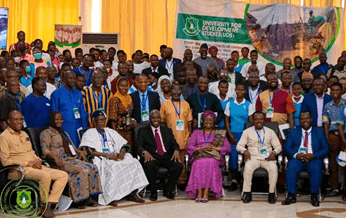By Samuel SAM
Stakeholders at this year’s University for Development Studies (UDS) Harmattan School have called for the incorporation and strict implementation of Ghana’s 40-Year National Development Plan to ensure efficient use of natural resources and long-term economic progress.
They argued that integrating the plan into governance would enhance petroleum revenue management, establish a robust monitoring and evaluation framework, and develop a comprehensive national infrastructure strategy. It would also ensure that successive governments assess and continue uncompleted projects rather than abandoning them, thereby fostering national development.
According to the participants, failure to review the constitution to incorporate the long-term development plan has resulted in numerous abandoned government projects, some of which are later appropriated by private individuals—draining national resources and hindering economic progress. They warned that project discontinuity not only leads to financial waste, but also erodes public trust in leadership.
Ghana’s 40-Year National Development Plan, spearheaded by the National Development Planning Commission (NDPC), aims to create “a just, free and prosperous society” by 2057, with a focus on structured spatial planning and the implementation of the National Spatial Development Framework (NSDF).
The 19th edition of the Harmattan School, organised by the Institute of Interdisciplinary Research (IIR) at UDS, was held under the theme ‘Changes in Government and National Development: Discontinuity in Continuity’. The event, held at the Andani Andan Academic Board Chamber on the UDS Main Campus, brought together academicians, researchers, students, NGOs, industry players and policy-makers to discuss Ghana’s development trajectory and governance challenges.
Call for political commitment
Former Chief Justice, Her Ladyship Sophia Akuffo (Rtd.), emphasised that national development is a continuous process, not a political competition. “Every government has a duty to honour and complete projects initiated by its predecessor. True progress is measured not by who starts a project but by what is sustained and completed for the benefit of all,” she stated.
She urged policy-makers to ensure that development initiatives are community-driven and beneficial to the people, regardless of political transitions.
African Union High Representative for Silencing the Guns, Dr. Mohammed Ibn Chambas, highlighted the importance of credible elections in preventing political instability that could deter investors. He stressed that constitutional reforms and implementation of the development plan would promote equitable resource distribution and economic growth.
Northern Regional Minister, Ali Adolf John, commended UDS for its contributions to national development and reiterated the government’s commitment to addressing the concerns of Ghanaians.
Need for long-term planning
UDS Vice-Chancellor, Prof. Seidu Al-Hassan, called for strong political will to implement the 40-Year Development Plan, emphasising that its mere existence is insufficient without dedicated execution. “For continuous national development, there is a need for a long-term plan that identifies the country’s natural resources and suggests sustainable ways to develop them,” he noted.
Director of IIR, Prof. Mamudu A. Akudu, cautioned against disruptions in national development due to frequent changes in government. He stressed that while reforms are necessary for innovation, there must be a balance between continuity in policies and necessary adjustments for progress.
The forum underscored the need for Ghana to adopt a structured approach to governance and development planning, ensuring that national policies, programmes and projects remain consistent across different administrations to drive sustainable growth.










